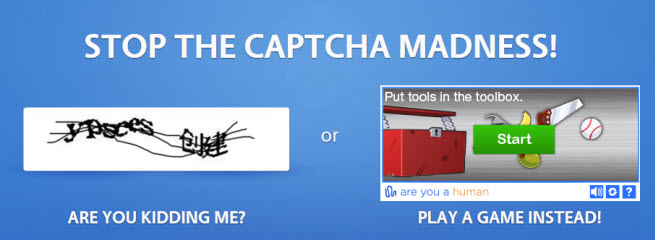Websites need to verify that a visitor is a real person and not an automated bot. But the CAPTCHA test that they came up with — where you have to type in the word that you see in a blurry distorted font image — is extremely annoying and often leads to multiple failures.
So a Detroit-based startup, Are You a Human, is replacing the CAPTCHA with simple minigames instead. It is releasing its human authentication tool, PlayThru, to help companies fight spammers and bots that have begun to circumvent CAPTCHAs. Companies using it include Quicken Loans and Fat Head, and users have played nearly 2 million games to date.
The term CAPTCHA was coined in 2000 by Carnegie Mellon University researchers who based it on the word “capture” and used it to as an acronym for Completely Automated Public Turing test to tell Computers and Humans Apart. The security tests have been used on sites that require users to sign up for an account, buy tickets, participate in online polls, or post comments. But since that time, hackers have figured out how to bypass the security test by re-using the session identification of a known test image.
On top of that, CAPTCHAs are frustrating to users who can’t discern the distorted text. About 20 percent of the users will leave a site rather than complete a CAPTCHA, according to the company’s research.
With Are You a Human’s tool, companies can embed a simple game instead. For instance, one minigame requires users to look at a set of five images and pick up the two tools and put them in a tool box. Or the user can drag and drop toppings onto a pizza. Since the games are dynamic and always changing, they are hard for computers to solve but easy for people to complete. PlayThru can improve security and entertain users at the same time, and it works easily on touchscreen smartphones. The company’s own survey of 1,000 users showed that they preferred PlayThru four-to-one over traditional text-based CAPTCHAs. Sites using it have seen their submission rates go up by 40 percent.
“Text-based CAPTCHAs are difficult to decipher and easy to break, which forces them to become increasingly more difficult to solve,” said Reid Tatoris, chief operating officer of Are You a Human. “This vicious cycle makes it frustrating for users, who many times will give up before following through to a site. PlayThru combines intuitive puzzles with proprietary algorithms to distinguish human interaction from malicious automated attacks, giving content providers confidence they are dealing with real humans and giving end users a much more pleasant experience.”
On a technical level, PlayThru integrates with multiple CMS platforms such as WordPress, Drupal, PHPBB, and vBulletin as well as libraries for all popular code formats. Tatoris said in an interview with GamesBeat that the idea came along when his co-founder Tyler Paxton, chief executive, was trying to get Hannah Montana concert tickets. Every time he snagged a seat, it was taken because he took too long to fill out the CAPTCHA.
“We stumbled on the idea of games and talked about the problem from a security view,” Tatoris said. “Natural patterns are hard for computers to pick up.”
They did a prototype in September 2010 and began working on it full-time in April 2011. They got seed money last year from Detroit Venture Partners and began testing at the end of November. The company has seven people.
Now they have more than 200 sites using it and are running 300,000 to 400,000 plays per month. On average, it takes 10 seconds to 12 seconds to play a game while the average CAPTCHA takes 12 seconds. Tatoris said the company plans to raise money in the next few months. They will incorporate branded games at some point in order to make money.
VentureBeat's mission is to be a digital town square for technical decision-makers to gain knowledge about transformative enterprise technology and transact. Learn More

